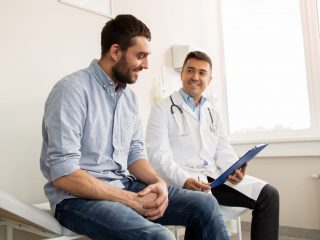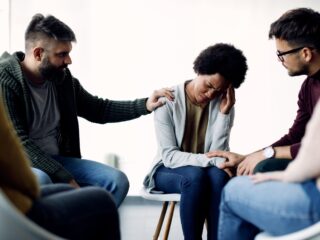A fellowship is any kind of support group; some popular ones include Alcoholics Anonymous, Narcotics Anonymous, and others. Fellowshipping essentially means joining in and participating in these programs and with the other members.
A fellowship in sobriety doesn’t necessarily need to be a group like AA or NA; it can simply be a group that has similar goals. 12-step groups are the most common, but other groups like SMART Recovery or Al-Anon for the families and friends also exist.
How Can It Help My Recovery?
Fellowships focus on recovery. The entire group’s goal is living a life without addiction, and as a part of that group, you can learn ways to live a sober lifestyle as well. Unlike a classroom with a teacher and students who are not on the same level, a recovery fellowship makes everyone an equal. You and your peers are working together to get sober so you can grow together into a group of healthy and happy individuals.
Fellowships provide a few different things to participants. First, they offer social support. This is the kind of support that is provided to people by peers or work colleagues; it can make a difference for those who feel isolated because they realize they can reach out to others within their group for help whenever they need it. It’s hard to figure out how to handle every situation on your own, and the advice and information your group who will relate can be a key element in your recovery.
Emotional support is another benefit you can receive from your 12-step group or other fellowship. When you’re going through so many changes in your life, your emotions are bound to be going crazy. Fortunately, the friends you make can help you by talking to you and working through your current problems so you can become more balanced and settle into a drug or alcohol-free lifestyle.
Something else you might be looking for is feedback. When you’re in a group, you’re more likely to receive feedback about how you handle situations and the way you are moving forward. Others will be monitoring your behavior and activities as you discuss them, and they may be able to help you recognize negative behaviors before they ever impact you. You may be able to catch relapses before they happen thanks to the support network you make.
Belonging to a fellowship in sobriety means that you can be motivated by others who want to see you succeed. As an individual, you could forget what it was like before you got sober and become less invested in your recovery; you could relax to a point where you actually become complacent and are at risk of relapse. The members of your group will provide you with regular reminders of just how bad addiction can be; while it may not be good to hear, it can motivate you to stay on the path to sobriety.
Your support network wants to see you succeed. The urge to relapse may come at a time when you feel weakened by stress or what’s happening in your life. Fortunately, the group that surrounds you is invested in your health and wellness. If you haven’t been in recovery long, you can rely on help from those who have more experience in fighting off addiction and relapse. You can turn to your group or meeting to discuss your relapse and how to overcome the struggles you’re currently facing.
Who Participates in This Process?
Fellowships in sobriety are made up of people like yourself who are recovering or recovered from drug or alcohol addiction. You’re all equals in the process, so you support each other and hold each other accountable.
Outside these groups, it would have been normal for people addicted to drugs or alcohol to receive support from others also struggling with addiction. This is a double-edged sword, because when they do get sober, it’s likely to mean that the person who is working on sobriety has to walk away from the friends he or she once had. When you’re first sober, you need support, so losing that connection to others can be hard. However, leaning on those who are not in recovery can be detrimental to your health, which is why going to a fellowship group is important. Those same people who you knew in the past can benefit from this group as well if they’re working to move forward and focus on living a sober lifestyle, so you can still be friends and network with those you know.
Where Can I Learn More About Substance Abuse Recovery Programs Near Me?
If you’re ready to get involved in a substance abuse recovery program or want to work with a fellowship group that can help you stay on the path to a sober lifestyle, our specialists can help connect you with others like yourself. Call 1-800-481-8457, or visit us online at www.Ohioarc.com to find out more about the groups working in your area.







